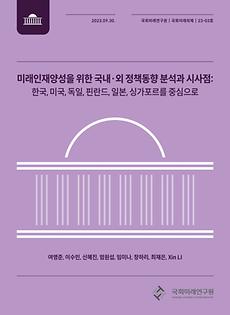
Analyzing Domestic and International Policy Trends for Fostering Future Talents and its Implications:
Focusing on Korea, the United States, Germany, Finland, Japan, and Singapore
⭘Korea is witnessing a steady decline in student numbers, correlating with the decrease in its total and school-age population. This trend has amplified public demand for enhanced education quality and the need for innovative educational approaches. Moreover, with the rapid expansion of AI paradigms and the emergence of an intelligent information society, there's an increasing necessity to establish an education system that effectively meets the evolving demands of technology.
⭘Taking these contexts into account, this paper aims to examine the educational reforms and policy trends in prominent countries (Korea, the United States, Germany, Finland, Japan, and Singapore) focused on nurturing young talent through digital capacity building. Additionally, it seeks to explore key policy and legislative proposals from these nations that could be adapted and applied to Korea in the medium and long term.
⭘This paper focuses on four key areas: (1) a comparative case study of education reforms and policies in various countries, (2) the evolving roles and separation of powers between central and local governments in education, (3) trends and shifts in teacher training policies, and (4) patterns in the allocation and reform of educational budgets. Based on these explorations, the paper then presents a series of policy and legislative recommendations.
<Table> Policy and Legislative Proposals to Foster Young Talent
Category | Key Implications and Policy Proposals |
Setting Policy Goals to Promote Digital Literacy as a Universal Basic Right | ㆍImplementing a societal consensus on the conceptualization and required competencies of the future young talents ㆍExpansion of financial investment for digital literacy education ㆍReform of curriculum based on digital literacy and interdisciplinarity
|
System and Policy-Improvement to Improve Excellence of Digital-based Education | ㆍExpansion of digital training programs for kindergarten and childcare teachers
ㆍUnification of state management of early childhood education and childcare into the Ministry of Education and integration between nursery and kindergarten services
ㆍEstablishment of guideline for digital technology and devices
ㆍSolutions for overcrowded classrooms and extension of education programs for elementary school students and after-school care and their policy improvement
ㆍPolicy improvement to expand after-school excellence course creation
ㆍAugmentation of programs including the digital-based minimum academic competence diagnosis system and online extracurricular courses
|
Innovation of the System to Expand the Infrastructure and Operate an Educational Platform for a Future-oriented School
| ㆍInitiation of development of a platform to connect or integrate local platforms ㆍEstablishment of common data standards and data protection and interoperability regulations ㆍExploration of the current state of information resources and infrastructure management at schools, monitoring, expansion of consulting opportunities, and system improvement ㆍEstablishment and improvement of national implementation system for educational digitalization ㆍInnovation of governance to draw up the budget of investment for digital infrastructure
|
Support to Provide Opportunities for Self-directed Capacity Building and Better Treatment of Teachers
| ㆍPrepare a roadmap for teachers’ capabilities development, including digital competency development ㆍImproving the treatment of teachers and improving systems to prevent teacher turnovers ㆍExpanding and diversifying teacher training programs to build expertise through lifelong learning ㆍRecruiting more highly qualified teachers by flexing and diversifying teacher credentials. ㆍStrengthening the linkages between teacher qualification, teacher training, teacher evaluation, and teacher training systems ㆍDevelopment and enhancement of contents and tools for teachers’ training programs based on industry-academia-research cooperation ㆍFormation of teachers’ learning communities and expansion of supports ㆍBuilding an integrated platform to support teachers’ training and learning activities
|
Transfer of Responsibility and Authority to Community-directed System to Foster Young Talents
| ㆍClarifying the allocation of authority and division of roles between the central and local governments
ㆍProvision of governance to foster young talent, which contextualizes characteristics of local communities
ㆍCapacity and professional skill building for local education authorities(Si/Do Offices of Education( and expansion of consultative bodies between Offices of Education and schools
ㆍDevelopment of more local curricula and related policies
ㆍCreating best practices in local curriculum development and sharing practices across regions
|